#Since we’re on the topic of ASD and ADHD
Explore tagged Tumblr posts
Note
hey, fellow person with both adhd and autism here. i definitely recommend doing some research on executive dysfunction. it's smth that people with adhd deal with often and from your post it sounds like you struggle with it too. adhd nd asd are tricky to navigate around, but they've also got their strengths smtimes. you've got this -tickleraptorss
I’ll have to check with my psychiatrist to verify the validity of the information I found online, but after looking at the examples of executive dysfunction… oh.
A lot of them are a mood. A big mood. Especially the whole “having trouble explaining my thought process because I understand it in my head, but get overwhelmed when I want to put it into words” thing. This might explain why I get stressed when writing anything for this blog (or anywhere else on the Internet for that matter).
This is going to be hard to navigate. My autism and ADHD were just diagnosed, after all. But I hope to find a way to improve my executive function, and if I can’t, I hope to find a way to live with it. Thank you for your kinds words.
#non-tickling#the colorful words of the color gray#Since we’re on the topic of ASD and ADHD#I’m debating on whether or not I should add ASD/ADHD or neurodivergent to my blog’s description#I might leave it out until I get more confident in myself and my ability to manage these conditions#I’m very much new to all of this#and I don’t want to offend anyone who’s on the spectrum has ADHD or both
2 notes
·
View notes
Text
I’ve been wrangling pretty hard with the idea that I might be neurodivergent, either ADHD or ASD or both. I look at these stories people tell, I talk to my neurodivergent friends, and I see so much of myself in them and their stories that it genuinely scares me. I feel like I should be happy to potentially be discovering something so significant about myself—but I’m afraid. I’m afraid of being alone forever, I’m afraid of never being understood, and I’m afraid of being judged before being given a chance to prove myself. All my life there has been this pattern of people meeting me and thinking I’m a weird person because I just don’t know how to present myself. I mask so much of who I am and I didn’t even realize it for most of my life. I’ve gone through life with such difficulty fitting in no matter how hard I try. It feels like the harder I try the weirder people think I am. I feel like an alien. My best friend is autistic (bless her heart for putting up with me). We’re so much alike and I see so much of myself in who she is and it’s unlike anything I’ve ever experienced with neurotypical people. Idk if that’s any kind of sign of what I am but it’s supplementary evidence that I think about a lot.
That isn’t even to mention the actual genuine health issues I’m having that make me lean towards either ADHD or that AND ASD. I struggle so fucking hard to do things, things I know I really enjoy doing. I am writing a novel, a story that has been in my head and developing for at least 2 years. I can fantasize about how great it’s gonna be in my head, and I’m almost always thinking about it and planning constantly. I’m like actually genuinely obsessed with it...and then when it comes time to put words on paper I can’t fucking do it. No matter how hard I try, how badly I wanna do it, I cannot fucking bother even opening google docs most of the time. I feel like I’ve wasted so much time that I can’t get back or make up for and it makes me so upset sometimes. I can typically manage stuff like washing the dishes or helping out around the house but only because I feel completely awful not pitching in at all since I’m almost 26 and still living at home. I’m afraid of many things but there are few things I fear more than giving up and making people think I’m a deadbeat. God, and the fucking memory issues.
I wish undiagnosed neurodivergency was a more inviting topic of discussion. It’s so hard to bring this shit up to people without them implying I’m faking it to be “quirky” or am already going as far as self-diagnosing myself. It makes understanding myself a lot harder when I’m afraid of seeking second opinions before deciding to persue a diagnosis. It isn’t my fault that neurodivergency has become so romanticized online. I just want to improve my quality of life. I don’t want to be this way but I very well might be anyway. Idk. I’ll seek out a professional.
Edit: Lmao side-tangent I’m editing in later because I just remembered this and thought it was funny. I had a job interview walk-through thing a week or so ago and one of the guys I met made a joke that he was the CEO of the entire company and I didn’t realize he was joking even a little bit until someone else told me. I truly believed this random person joking about being the CEO of Goodwill was the CEO of Goodwill. What that says about me and my place on the spectrum, I will leave up to interpretation /j
2 notes
·
View notes
Text
ADHD in DSMP
So about a week back, I made a post about Karl Jacobs (a bit of a passive aggressive one, I’ll admit, but I think it was justified), complaining that a lot of the ‘criticism’ I see about Karl is actually rather insensitive towards his ADHD. I got a lot of responses to that post, and the most common sources of confusion I saw were:
People not understanding what I was saying they should avoid being judgmental of, or-
People who didn’t know that Karl had ADHD or didn’t understand which behaviors were caused by it.
First of all, Karl has confirmed that he has ADHD.
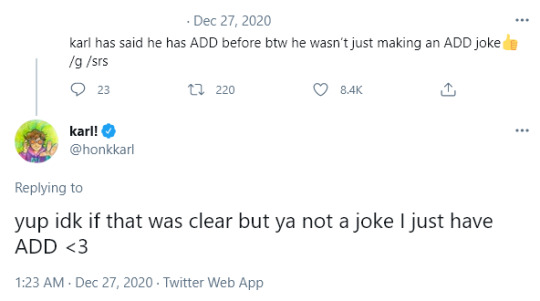
(NOTE: Yes, I know he said ADD. ADD and ADHD used to be categorized as separate disorders, but in the most recent edition of the DSM, it was decided that they are both simply subtypes of the same disorder- ADHD is the correct technical term. ADD is still sometimes used as shorthand by some practitioners to diagnose primarily-inattentive ADHD, but it's a bit outdated.)
Secondly, that original post made me realize that a lot of people who may be well-meaning may genuinely not fully understand ADHD and its symptoms as well as they want to or think they might. If you aren’t aware, Karl isn’t the only one in the DSMP with ADHD- to my understanding, both Technoblade and Dream have confirmed that they have it as well. So, I thought it would be helpful to put together a comprehensive crash-course on ADHD symptoms and how they effect people’s behavior!
Now, before we go further, I want to address something- as I said earlier, I saw some people unsure of whether certain behaviors are ADHD or “just his personality”. I feel the need to point this out above the read more so people will see it. To answer this question, as someone with ADHD;
A lot of times, it’s both. ADHD is a neurodevelopmental disorder, meaning that it’s caused by the way your brain developed from birth. A lot of the symptoms and effects of ADHD are extremely influential towards the way we think, act, and behave, to the point where “symptoms” and “normal behavior” really don’t have a clean differentiation. This is why it’s technically classified as a ‘disorder’, instead of an illness. While certain aspects of it can require treatment, the condition itself as a whole is not something to be mitigated or eliminated- it’s a part of who we are as a person. This is also why sometimes, even if you don’t have ADHD, you’ll look at certain specific behaviors or experiences and go “Oh, but I do that too!”. A lot of ADHD ‘symptoms’ are just a bunch of normal traits or behaviors, but in combination with each other and some actually problematic aspects, form the appearance of the disorder.
So, what are you allowed to nitpick about it? Well, there’s no real ‘authority’ on this, and even if there was it certainly wouldn’t be me. But if you want my opinion? Nothing.
See, here’s the thing- what I was trying to say when I made that post was not that you can’t be critical of Karl. If you want to say something about his Actions, his Ideals, or the content he creates- sure, go for it, that’s fair. I will agree that there are some very valid and constructive points to be made. But when you post ‘criticism’ about the way he speaks, his interests or preoccupations, his personal behaviors? That’s not criticism. That’s just judging someone.
And you’re allowed to think that stuff! Nobody can control what annoys or bothers them. It doesn’t necessarily make you a bad person. But you don’t need to be vocal about it. You can keep your mean thoughts to yourself. And if you do make posts or communities or whatever about judging someone for things they can’t change about themselves, don’t call it “criticism” or try to morally justify it. It’s not productive or righteous, it’s just rude. Nothing else.
Anyway. Back to Education!
The following will be a descriptive list of visible ADHD behaviors, using Karl’s behavior as examples.
I feel the need to add a disclaimer here- I am not a mental health professional. However! I have ADHD myself, I have taken some psychology courses and done a Lot of research into this stuff, and I’m the daughter of a therapist with access to a DSM. While I’m not an expert, I’d like to think I’m fairly well versed and knowledgeable on at least ADHD. (That being said, if by chance anyone who Is a professional sees this post and notices mistakes, by all means let me know and I’ll fix it!!)
WHAT IS ADHD?
You’re here for the behaviors more than the science, so I’ll keep this short and sweet. ADHD is Attention Deficit Hyperactivity Disorder (Known in the past as Attention Deficit Disorder). Despite its name, the root problem of ADHD is not in the person’s ability to pay attention, but their brain’s capability to manage itself. In simple terms, people with ADHD have a lot less control over what their brain does and wants. This results in some behavioral differences along with some personal challenges, namely a difficulty with attentiveness and self-discipline.
Now, onto the symptoms!
ATTENTION
This is perhaps the most visible and pervasive of the ADHD symptoms, hence why it’s the namesake. Inattention is a lack of focus and an inability to stay present and occupied with certain tasks or thoughts.
Because ADHD impairs self-management of the brain, people with it have an extremely hard time directing themselves anywhere but where their brain instinctively wants to go. This results in inattentiveness and the easiness of distraction that is often mocked or stereotyped for people with ADHD.
Here are some examples of how Karl can sometimes display his inattentiveness;
When he has an idea that he seems passionate about, only to drop it or switch to something totally different without warning soon after (either forgetting or getting bored of his original idea).
When he sets out to do something like a build, works on it for a short amount of time, and then immediately gives up or gets someone else to do it.
When someone else is talking and he totally zones out. (NOTE: While I wont make a whole section for it because it’s not easily observable, maladaptive (constant and intrusive) daydreaming is a common ADHD symptom as well!)
It’s important to remember that the whole problem with ADHD is that we can’t control when or what we focus on. When someone with ADHD zones out during a conversation or activity, it doesn’t mean they’re doing it on purpose, and they likely don’t mean any offense! We often are trying our best to listen or participate, but our brain just wont cooperate.
However, inattention is not the only way ADHD effects our focus. There’s also what’s called hyperfocus or hyperfixation, which is when we are so absorbed into a single subject, task, or idea that it is extremely difficult to get us to think about or do anything else. This is usually because our brains have found something that is getting those satisfaction chemicals flowing, and it’s clinging to that with everything it’s got.
People with ADHD will often experience brief periods of hyperfocus. Think of how Karl talks about spending hours straight working on a build or project without eating or drinking, or how he’ll sit down to play a game with someone and end up going six hours without even noticing.
There are also hyperfixations, where someone with ADHD becomes extremely preoccupied with a certain subject, topic, etc. for a period of time. These can be short term- personally, my hyperfixation can sometimes change as quickly as a couple weeks at a time. However, it can also be long term. Karl has been obsessed with Survivor since the second grade- not to mention his memorabilia, rambling, and constant references to Kingdom Hearts.
HYPERACTIVITY/STIMMING
This is a BIG one for Karl. I should clarify; ‘stimming’ is not a technical term, and in professional situations these behaviors are just referred to as Hyperactivity. However, I personally like the term stimming much more and find it far more accurate to what the behaviors actually are, so I’ll be using that instead for this post.
If you’re not already familiar, ‘stimming’ (derived from ‘stimulation’) is an unofficial term used to describe consistent and abnormal patterns of physical and vocal behavior typically expressed by people with ADHD and ASD (Autism Spectrum Disorder). This includes things that people usually call fidgets or tics.
(NOTE: There are differences in how people with those two disorders stim. This post will explain stimming specifically from an ADHD perspective! ASD stimming is caused by very different factors and presents itself in much different ways. Do your own research if you’re curious!)
There are two major observable forms of stimming- physical and vocal. Karl expresses both VERY often! I’ll use examples for each type;
Physical Stims: Flapping his hands/arms, jumping up and down when he’s excited, twisting around into odd positions in his chair, throwing, hitting, or tapping things, standing up and pacing around when he’s hyped up or laughing, twisting his rings, etc.
Vocal Stims: When he gets excited and repeats a certain phrase incessantly (Think any variation of “I’m popping off”), making certain repetitive noises while he’s focused on something or bored (”la la la”, the meow-noises, the weird heart-beat noise, etc.), singing or humming, tongue clicking.
It should be noted here that it’s pretty common for people with ADHD to get “stuck” on certain phrases or noises, and be unable to stop repeating them (reminiscent of echolalia, a symptom of ASD, but not the same thing). Think of how Karl might sometimes keep making a weird noise for an extended period of time even though it’s not that funny, or that one time he was physically struggling to keep himself from singing the Bakugan theme. These repetitions are completely impulsive and trust me, we usually know how annoying it is while we’re doing it, but we physically cannot stop.
ADHD stims are caused by the fact that the barrier between our brain and body is much weaker than a normal person’s. Because of this, most ADHD stims are actually very positive expressions of joy, excitement, or enthusiasm! Y’know how when you get excited, you feel like you wanna jump or dance? The ‘hyperactivity’ of ADHD is basically just that, but we don’t have the self-control to Not do it.
Stims can be caused by negative feelings like overstimulation, but in ADHD this is not nearly as common. Usually, the most negative reason we’ll stim is when we’re bored- in that case, our brain isn’t getting the Constant Stimulation that it naturally wants, so stimming is a way to make our own.
Whatever the cause, stimming is natural and impulsive. While different people experience it to varying degrees, those who regularly stim typically have little to no control over it. Suppressing stims is very hard and very frustrating to do.
Besides that, like I said- ADHD stims are often an expression of joy, excitement, or enthusiasm. They’re a beautiful thing that shouldn’t be seen as shameful or annoying!
BEHAVIORAL DIFFICULTIES
ADHD is a disorder which causes a lack of self-control. Naturally, this means that people with ADHD are inherently reckless, impulsive, and struggle with a lack of self-discipline that they cannot fix.
Of course, people with ADHD do still have some level of self-control, and they are still responsible for conscious, long-term behavioral patterns and decisions. However, in regards to most things, they are much, much less capable of controlling themselves than an average neurotypical person is.
These are some examples of how this will often present itself in Karl;
Excessive rambling, dragging on a joke or conversation when it could and should probably have been dropped, etc.
Speaking over or interrupting other people (NOTE: As someone with ADHD- THIS IS ALMOST ALWAYS UNINTENTIONAL. I know it can seem rude or annoying but I promise, 90% of the time if someone with ADHD talks over you, they either didn’t realize or physically couldn’t help it. Please try to be patient!)
Lack of awareness towards social cues (NOTE: Unlike ASD, in which the person is incapable of/has problems fully understanding social cues, ADHD results in a lack of awareness. For whatever reason, we’re often just not paying close enough attention to pick up on things like body language, tone of speech, and facial expression as well as we would normally.)
Indecisiveness and overthinking
Bluntness, lack of subtlety
Unintentional dismissiveness, accidentally ignoring things/people (NOTE: Again, this behavior is purely accidental. In this case, it’s usually just the person genuinely not hearing or processing things.)
Making noises, speaking, joking, etc. at inappropriate times
There’s probably more, but I think you get the idea by now. A lot of the time, behavior which results from ADHD can be seen as rude, lazy, dismissive, or otherwise intentionally harmful. In reality, we just aren’t wired to navigate common social interaction with grace.
In Karl’s case, he’s clearly an incredibly sweet, empathetic, and kind-hearted person, if the various close friends who have talked about him are to be believed. Just because he talks over people or makes a poorly timed joke, that doesn’t mean he meant any harm.
I think that’s about it for how much I wanted to point out! You can do more research if you’re curious, but I feel like this post should be enough to tell you what to keep in mind and be understanding about when talking about/making judgements on Karl, and other people with ADHD.
#sorry if this is longwinded but I had a lot to say so [shrug]#karl jacobs#dsmp#dream smp#dreamwastaken#ghost.txt
235 notes
·
View notes
Text
Is it time to tear ANOTHER Dhar Mann video to shreds? YOU BET.
I've been sitting on this one for a bit because I wanted to make sure I talk about this tactfully. The subject of parents abandoning their disabled children is a very touchy one.
Parents abandoning their disabled children simply for being disabled is way too common. Like, I understand that not everyone has the resources to care for a disabled child (which is why you reach out for help, and why people like me, who work with disabled people, exist), but it doesn't mean you just walk out of their life. There are exceptions, like if you truly didn't want children or something like that, but just flat-out walking out of your kid's life BECAUSE they're disabled is fucked up.
I know someone personally whose biological mother abandoned her when she was born. Why? Because she's disabled. Physically, and mentally, to a point. I work with this woman on a daily basis. I don't really know WHY exactly her biological mother abandoned her, but I do know that her being disabled was part of it. It's sad. It doesn't affect her, thankfully. I'm happy that she's got her biological dad, her brother, and another maternal figure in her life, at least.
ANYWAYS. Before we get to the topic at hand, I need to put an obligatory trigger warning, like I do with EVERY Dhar Mann post:
This post will be talking about parents abandoning their disabled children simply for being disabled, treating disabilities like they're tragedies (in this case, we're talking about autism...again), divorce, and some SPICY ableist bullshit from an allistic (nonautistic) PIECE OF SHIT.
If any of this triggers you or makes you uncomfortable in any way, you don't have to read this post. This isn't worth putting yourself in a bad state mentally. I would never ask for any of you to put yourselves in that position all for a post. Put your mental health and well-being first. Consume media that sparks joy for you.
As far as my response goes, it's definitely more calm than normal. Funny....since this video is about autism spectrum disorder again. (Third time's the charm, huh, Dhar Mann? NOT.)
LET'S FUCKING GET IT.
The video starts off with these two parents (Gwen and Allen) in a psychologist's office. The psychologist tells the parents that their son (Chance) is autistic, and she tries to explain what autism is to the parents, but Allen cuts her off. Why? Because he teaches at a prestigious university, so he AUTOMATICALLY knows what autism is from that fact alone.
Um, excuse me? Just because you're a teacher at a prestigious university, it doesn't mean you're an expert in everything. It doesn't make you an expert in ASD or anything like that. Unless you SPECIALIZE in that area. Even then, shut the fuck up. The people who know about being autistic are AUTISTIC PEOPLE THEMSELVES! SHOCKER.
Hey, Dhar Mann! QUIT WITH THE VIDEOS ABOUT AUTISTIC LITTLE WHITE BOYS AND YOUNG WHITE AUTISTIC CISHET MEN! I'M SICK AND TIRED OF IT. It's annoying, ignorant, and it feels like you're doing this on purpose at this point to piss people off. If you're so uninformed about autism in women and girls, FUCKING ASK AUTISTIC WOMEN AND GIRLS! DO BETTER RESEARCH THAT DOESN'T INVOLVE AUTISM SPEAKS. The Autism Self Advocacy Network (ASAN) and the Autistic Women and Nonbinary People Network (AWN) are great organizations to go to for any kind of research on ASD in women and girls. STOP GOING OFF OF THE BRAINS OF AUTISTIC WHITE BOYS AND AUTISTIC WHITE MEN.
I don't feel I need to go too deep into the fact that autistic women, autistic girls, autistic nonbinary people, autistic BIPOC, autistic AAPI, autistic LGBT people, autistic teenagers, and autistic adults exist. Y'all already know.
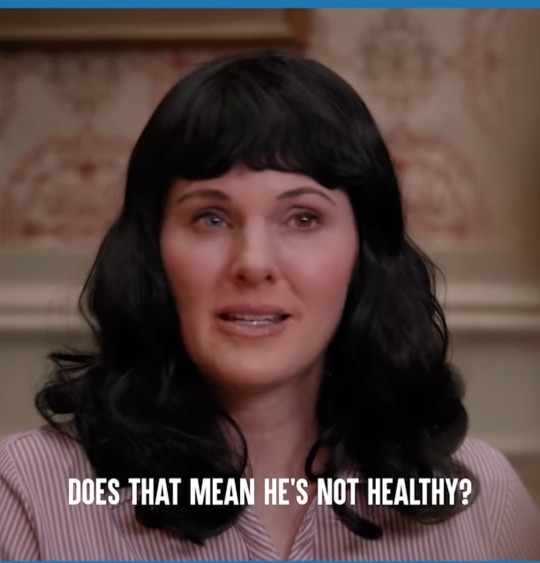
Gwen asks the psychologist if that means Chance isn't healthy. (I understand not knowing about autism, but don't treat it like it's a terminal illness. Please.) The psychologist tells her that Chance is fine, but he just learns differently and might need more support compared to his peers.
Yeah, autism can affect how you learn about certain things (limited and repetitive patterns), but there are other disabilities that can affect learning as well. Like how dyslexia can affect your ability to read, dyspraxia can affect your ability to do math, and Attention Deficit Hyperactivity Disorder (ADHD) can affect your ability to focus or on impulse control. Autism affects how your brain is developed, it affects you socially, behaviorally, and how you communicate.
Allen is upset, says that he can't have a son "with a learning disability" (ASD is a neurological disability, not necessarily a learning disability), and treats Chance like he's stupid for being autistic. Gwen tells her husband that autism doesn't make you any less intelligent, WHICH IS SO FUCKING TRUE. ABSOLUTE FACTS. I was totally with her until she began that little monologue with "Just because a person HAS autism". SAY "JUST BECAUSE A PERSON'S AUTISTIC" INSTEAD! IT'S NOT HARD. PERSON FIRST LANGUAGE ISN'T WHAT EVERY DISABLED PERSON PREFERS. Allen says that "they could have another kid" and "put Chance up for adoption". Gwen obviously wasn't down with that. Allen gives his wife an ultimatum that it's either HIM or their son Chance. Gwen says that she can't choose between the two, but she will stand by her autistic son. Allen gets up and leaves the office, saying he wants a divorce.
Years pass by, Gwen is single and taking care of her autistic son Chance, and Allen has a new life with a ✨perfect son✨ (Samuel). He never mentions the son HE abandoned (Chance). He's completely forgotten about Gwen and Chance. (YOU OWE SO MUCH CHILD SUPPORT, ALLEN.)
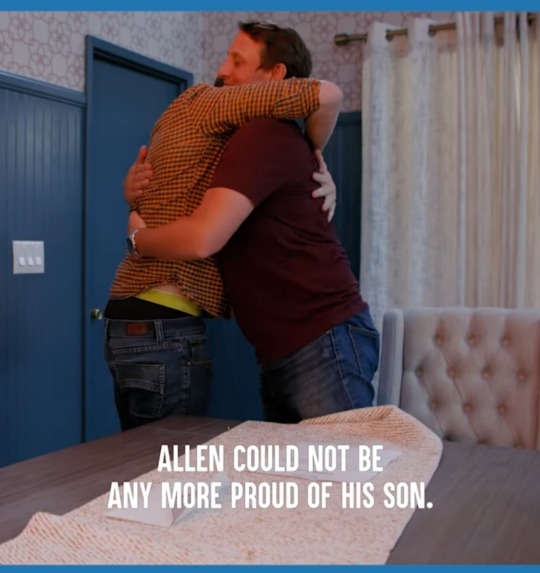
Hey, Allen, how much do you wanna bet that your ✨perfect son✨ Samuel is autistic too?
There's the SATs, they're announcing a winner, and guess who it is? IT'S OBVIOUSLY CHANCE, OF COURSE. He's got the highest score in the country, with Samuel in second place. Allen is PISSED.
Chance gives a speech about how his mom really helped him, he struggled with autism, how Allen LITERALLY ABANDONED HIM, and THE CROWD GOES FUCKING WILD. Samuel, instead of being a sore loser, APPLAUDS FOR CHANCE. Stay humble, Sam.
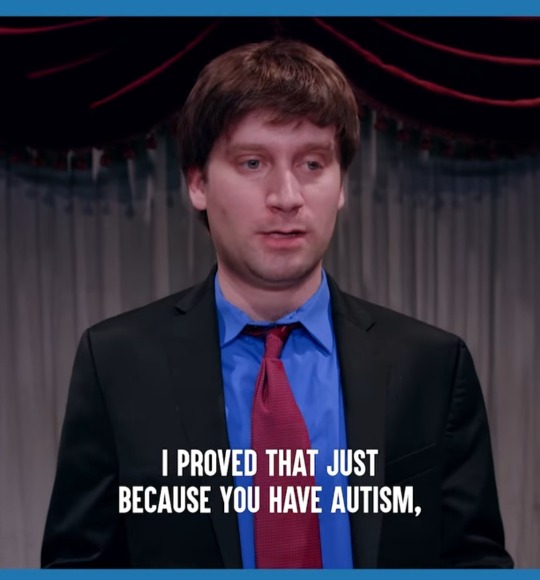

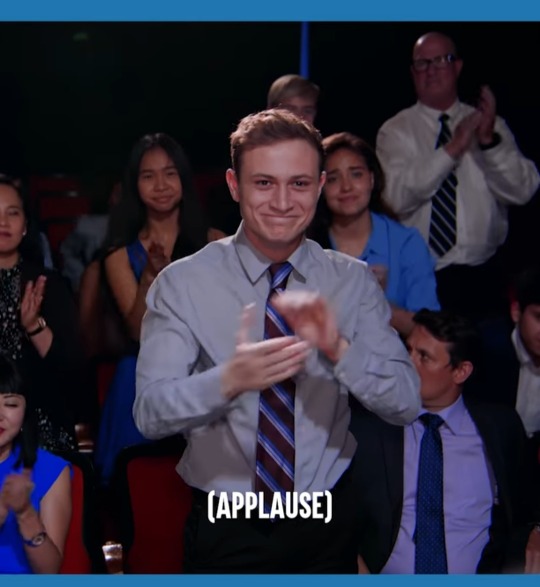
My thoughts on the video? If you cannot tell by my tone throughout this post, IT WAS DOG SHIT. This video was insensitive to the true reality of parents abandoning their disabled children just because they're disabled. What do I expect from Dhar Mann at this point?
Here's my response to his video below. Don't worry, I will fully type out my response soon for anyone who cannot read the screenshots easily. It's a lot easier for me to do that on the desktop site than it is for me to do it on my phone.
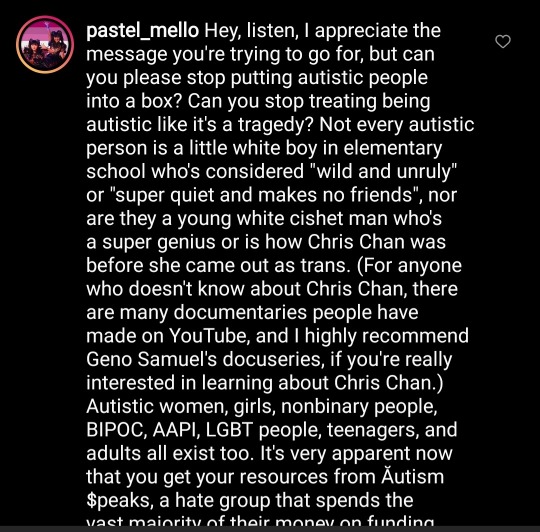
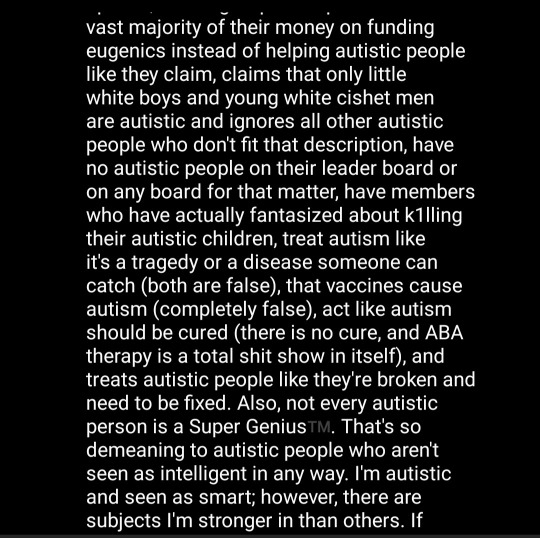
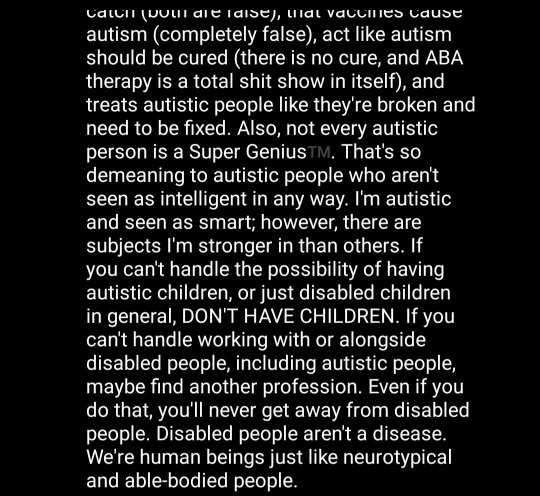
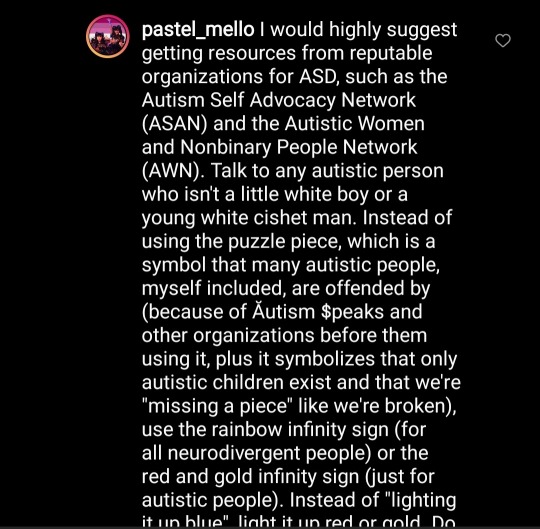
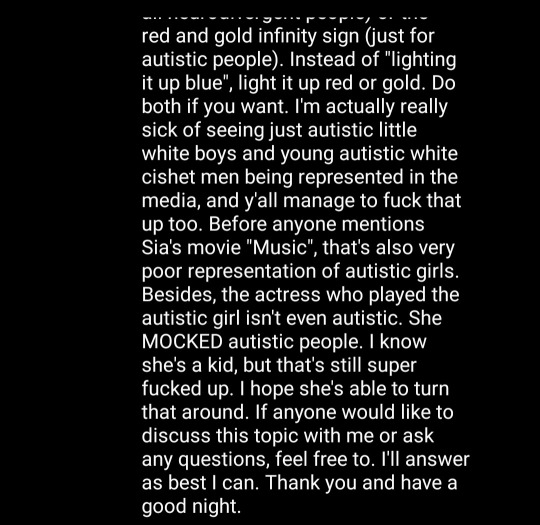
For anyone who can’t read my response, I’m typing it out for you. Like I said, it’s easier for me to type it out on the desktop site than it is for me to type it out on my phone. It’s a real royal pain in the ass. But because I’m trying to make my posts easier to read for people, I’m doing this anyway. /lighthearted
First, second, and third screenshots (broken up into paragraphs):
Hey, listen, I appreciate the message you’re trying to go for, but can you please stop putting autistic people into a box? Can you stop treating being autistic like it’s a tragedy? Not every single autistic person is a little white boy in elementary school who’s considered “wild and unruly” or “super quiet and makes no friends”, nor are they a young white cishet man who’s a super genius or is how Chris Chan was before she came out as trans. (For anyone who doesn’t know about Chris Chan, there are many documentaries people have made on YouTube, and I highly recommend Geno Samuel’s docuseries, if you’re really interested in learning about Chris Chan.)
Autistic women, girls, nonbinary people, BIPOC, APPI, LGBT people, teenagers, and adults all exist too.
It’s very apparent now that you get your resources from Autism $peaks, a hate group that spends the vast majority of their money on funding eugenics instead of helping autistic people like they claim, claims that only little white boys and young white cishet men are autistic and ignores all other autistic people who don’t fit that description, have no autistic people on their leader board or on any board for that matter, have members who have actually fantasized about k1lling their autistic children, treat autism like it’s a tragedy or a disease someone can catch (completely false), act like autism should be cured (there is no cure, and ABA therapy is a total shit show in itself), and treats autistic people like they’re broken and need to be fixed. Also, not every autistic person is a Super Genius(tm). That’s so demeaning to autistic people who aren’t seen as intelligent in any way. I’m autistic and seen as smart; however, there are subjects I’m stronger in than others.
If you can’t handle the possibility of having autistic children, or just disabled children in general, DON’T HAVE CHILDREN. If you can’t handle working with or alongside disabled people, including autistic people, maybe find a different profession. Even if you do that, you’ll never get away from disabled people. Disabled people aren’t a disease. We’re human beings just like neurotypical and able-bodied people.
Fourth and fifth screenshots (broken up into paragraphs):
I would highly suggest getting resources from reputable organizations for ASD, such as the Autism Self Advocacy Network (ASAN) and the Autistic Women and Nonbinary People Network (AWN). Talk to any autistic person who isn’t a little white boy or a young white cishet man.
Instead of using the puzzle piece, which is a symbol that many autistic people, myself included, are offended by (because of Autism $peaks and other organizations before them using it, plus it symbolizes that only autistic children exist and that we’re “missing a piece” like we’re broken), use the rainbow infinity sign (for all neurodivergent people) or the red and gold infinity sign (just for autistic people). Instead of “lighting it up blue”, light it up red or gold. Do both if you want.
I’m actually really sick and tired of seeing just autistic little white boys and young autistic white cishet men being represented in the media, and y’all manage to fuck that up too.
Before anyone mentions Sia’s movie “Music”, that’s also very poor representation of autistic girls. Besides, the actress who played the autistic girl isn’t even autistic. She MOCKED autistic people. I know she’s a kid, but that’s still super fucked up. I hope she’s able to turn that around.
If anyone would like to discuss this topic with me or ask any questions, feel free to. I’ll answer as best as I can. Thank you and have a good night.
Before I get attacked for mentioning Chris Chan in my response, I bring up Chris Chan because allistic people think that every autistic person is like her (especially before she came out as trans). That person is part of why I wasn't open about being autistic or talking about my diagnosis until this year. I didn't want to be grouped up with Chris Chan because I do have very similar interests to her, I've been seen as cringey for having said interests, and just the way Chris treated autistic people who were formerly diagnosed with A$p3rg3r$ $yndr0m3 (like I was) really made me feel even more alienated.
Also, S1a supports A$ (Autism $p3aks). She's not a very good person to support. Some of her music is good, but her as a person....no. Her movie "Music" was gross, from what I've read about it and seen pictures of.
If you've read this far, thank you so much!
#mello speaks#dhar mann#dhar mann talk#dhar mann will live to regret his decision to make these fucked up cringe videos#dhar mann will live to regret his decision uwu#dhar mann is a piece of human garbage#please stop supporting dhar mann#autism isn't a tragedy#we need better representation for autistic people who aren't little white boys or young white cishet men#dhar mann is a cringe ass nae nae baby#tw abandonment#tw ableism#cw sia mention#cw chris chan mention#tw dhar mann
51 notes
·
View notes
Text
Personal connection to HFA paper... Call it the beginning of self-exploration?
I’m writing a personal connection paper to a study on High-Functioning Autism/Aspergers (which is a term I learned recently I guess is not as favored any more, but it’s been used - was the term I grew up with as far as other family members - and has identifiable traits that people not highly versed can identify with, so get over it.) I'd say do it.
My family is prone to HFA and ASD.. It has been suggested by family members over the years that I'm Asperger/HFA, but my dad & grandmother never pushed to test (my Dad is also most likely undiagnosed Aspergers/HFA), and I felt growing up that my aunt's coddlement of my cousin and his disabilities allowed him to use his disabilities as a sort of crutch through life, where he may have worked with them a little better otherwise, so I took the route of solidly denying any disability chance, and just told myself it was just personal shortcoming -- I needed to make extra effort to be organized, to be on task, etc.
In a way, I don't regret the path I took - I own and run a dog rescue at 26 that I did all the legal paperwork and filing on, I work 28 hours a week as a trainer, and people constantly compliment me on how motivated and put together I am... however, there's also major issues in my life that I'm working through and have led me to explore the ASDs a little more personally at this point:
- I have a horrible sense of organization. I gravitate towards the neatness of everything in places, boxes, etc.. but maintaining organization is horrible... in about a week, my car/room will go from spotless to like a homeless hurricane hit... I'm getting better about setting myself on a strict path of putting things back in their exact place as soon as I use them, and I do find myself thinking about it more, but still, I battle with chaos and disorder... paperwork seems to jumble itself, etc... Then I become stressed and non-functioning (or functioning out of necessity but not necessarily doing well), and this cycle repeats and repeats. As a child, I was a tornado too, but because there was no attempt to diagnose an illness (by 8th grade I was in IEP for being Emotionally Disturbed - a result of bringing part of my beloved knife collection to school which a friend used to cut herself after "borrowing" one, and I believe ADHD at that time as well, which I'll get into more late), so my messiness was seen as defiance, and punished.
- ADHD or HFA? & Substance abuse issues: In about 10th grade, I was put on Vyvanse for ADHD. I'd already been convinced to try meth by girls in the neighborhood I'd known since I was little, and it got out of control because the main benefit I saw was I WAS FINALLY GETTING THAT MATH HOMEWORK I WAS BEHIND ON DONE!!... well, Vyvanse made me get schoolwork done too, but in a jittery, hyper-focused way that reminded me too much of methamphetamine, so I used it on and off for school for maybe a school year, but it did not answer my problems long term, and was not enjoyable. If HFA is a contributer for these issues, it is possible that being diagnosed properly and treated in a different way would not have more beneficial effect than Vyvanse, and it's also possible that with proper support and help, I may not have chose/continued to use meth to try to catch up on math, because I could have had plans in place in school, and better management at home, to not get as behind as I did in the first place.
- (Un)Comfortable Conversation/Specialized Interests: Between the fallout from separating from a group of drug related people from above, conflict with my family from childhood on (my grandmother thought I was insolent and "taunting" her when I would SHRIEK in fear as a child of punishment, among other conflicts), and never really fitting in at school from a young age, and losing friends rapidly and telling my grandmother at home, who would wonder out loud, "How do you go through friends so fast? Are you doing something? Picking wrong friends?"... so from 3rd grade on, the self-belief that I was difficult to make friends with, I was different, and that my friendships weren't that strong because I couldn't relate to them in similar ways began to grow & got stronger over the years, and now as an adult, I go into almost panic attacks about new social situations sometimes, and it takes me a LONG time to trust, get close to new people, and they often consider me a friend before I've reached that comfort zone... not because I'm antisocial -- I can remember one of my earliest childhood grievances being: "I just want to be everyone's friend! I want everyone to like me!!!", but because I'm terrified, awkward, feel like a burden or sore thumb sometimes, and feel that I either talk waaaaay too much, or I can't make small talk like normal people do (what do you say? "Hey, so, beautiful weather we're having today!" sounds staged. Even if it didn't, what do I say after that? How do I keep the conversation going??!)...
Social Impact: If I had been diagnosed with HFA as a child by a medical professional (assuming I am), I could have possibly had action plans, exercises in developing social skills, being interested in a wider set of topics people want to talk about, not being SO excited to predict what someone's going to say and finishing their sentence, or slowly down with my eagerness to reply once I get talking. I could have grown up with less of the belief that it was something I was doing, that I pushed people away after a while or that I wasn't as good as their other friends --- in actuality, I had a lot of problem behavior as a child as you can see, and I gravitated to problem people throughout my life (in grade school, I have no answer for, other than moving from very diverse Anaheim to Temecula which was still pretty small, I was a culture shock in addition to all my oddities... but in the end of middle school up through high school, I hung out with kids who drank, smoked, and honestly burned through other people too, so this is a partial answer... but again, what behavioral and environmental aspects may have caused me to gravitate towards that type?..)
Adult impact: My biggest problem has come later in life. Throughout high school, I hung out with bad kids, like I said... I did great meeting new people, because I had a very comfortable approach of "Hi, I'm Mariah, let's get drunk and make bad decisions", and substance abuse was my crutch that allowed me to socialize, plus conversation is pretty easy and unjudged when everyone is drunk. However, turning 19 and getting away from those kind of people steadily til 23 left me realizing: I don't drink anymore.. NOW how do I talk to people?! This point was where I retreated a lot into the solace of my dogs, as I've done throughout my childhood, and the training/dog rescue/veterinary school aspiration began to take place. I am now 26 with all of this great stuff going on, but A) dogs are now my comfort zone. I'll talk your ear off about that with no social anxiety. If we're not talking about dogs, I'm still probably really uncomfortable and unable to casually maintain conversation as well. B) Dog rescue & training has become my therapy from my social awkwardnesses, and I push myself HARD to achieve for a continuous sense of self-satisfaction (which is generally pretty short-lived on my end: off to the next mountain to climb! And the next!)... I am now stressed, irritable, and experience panic attacks probably once a week. But also, because there is not much of a social group (I have accumulated a small but very important, intellectual, successful group, many who are working through very similar issues with themselves aside from organization), I have more time to overwork myself, when other people are out going to movies, doing random things, etc... So if I had more focus on developing and maintaining social confidence, that is possibly less grief I could have gone through.
For my family, and if I get the diagnosis when I see a medical provider, HFA is not a horrible diagnosis (I know I'm talking about all the negatives above) -- my family is phenomenally more intellectual than anyone I know, the creativity abounds in individual ways, and the original ideas and approaches to things that I have amaze people -- I've always just thought of things in different terms and solutions than other people, and was surprised when they commented on it --- "Why WOULDN'T you think of that?!"...
I think my fear of the stigma and label was the worst thing. "What if people don't like me? What if they think I'm crazy or stupid?"... well. A lot of people DIDN'T like me anyway, some without ever meeting me... that's not going to change, and it happens to typically developed people as well. I feel that instead, people disliked me anyway, but I ended up internalizing that and then being uncomfortable with myself, or not liking myself. Some people still think I'm stupid with or without a label, but talking to me, reading my writing, or looking at my test scores would disprove that in a second... And to keep a clean, put-together appearance over the years so people wouldn't think I was crazy... well, that turned into me instead wondering if I was crazy.
It's totally possible that I don't have any ASD, and that my issues are personal or from other places (childhood abuse, etc), I haven't been diagnosed or not officially yet - this group is the beginning of my exploration and path to being tested... but even if I'm not, if I had been tested, I wouldn't be here wondering.
I think finding out is your best option. No, your child doesn't? Well, then on with life as usual! But if they do, I genuinely feel the diagnosis and proper management, counseling, and building as an adult will help your child love themselves more, enjoy more out of life, and prepare better to be an adult.
Good luck!
#high functioning autism#austim#aspergers#mental health#psychology#paper#writing#self expression#self exploration
1 note
·
View note